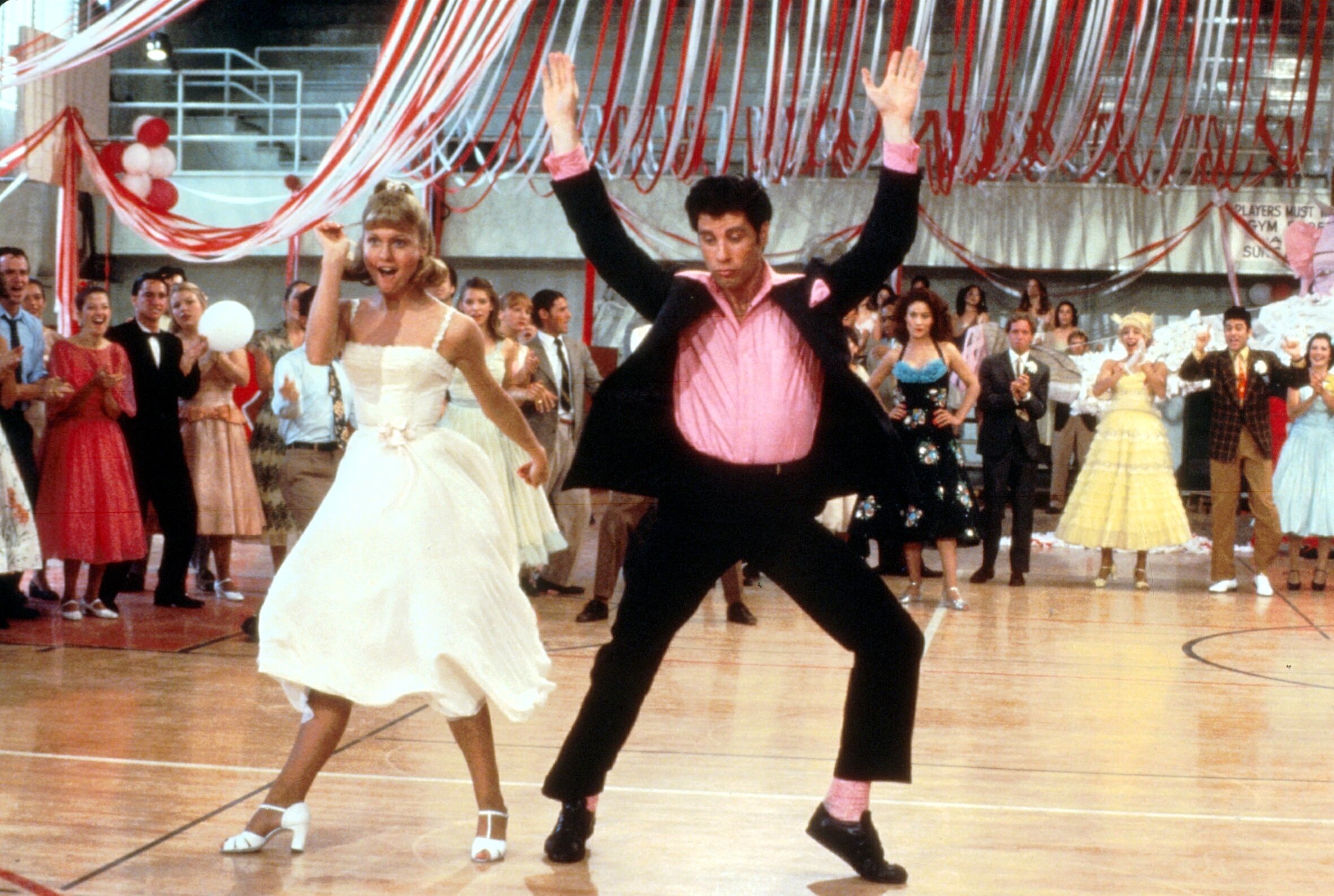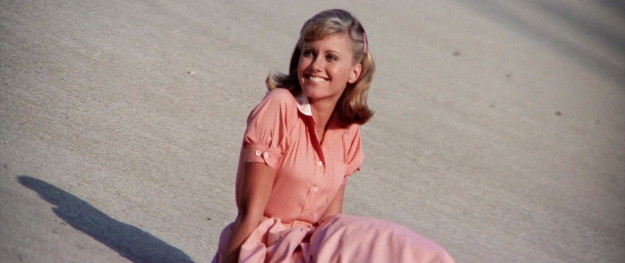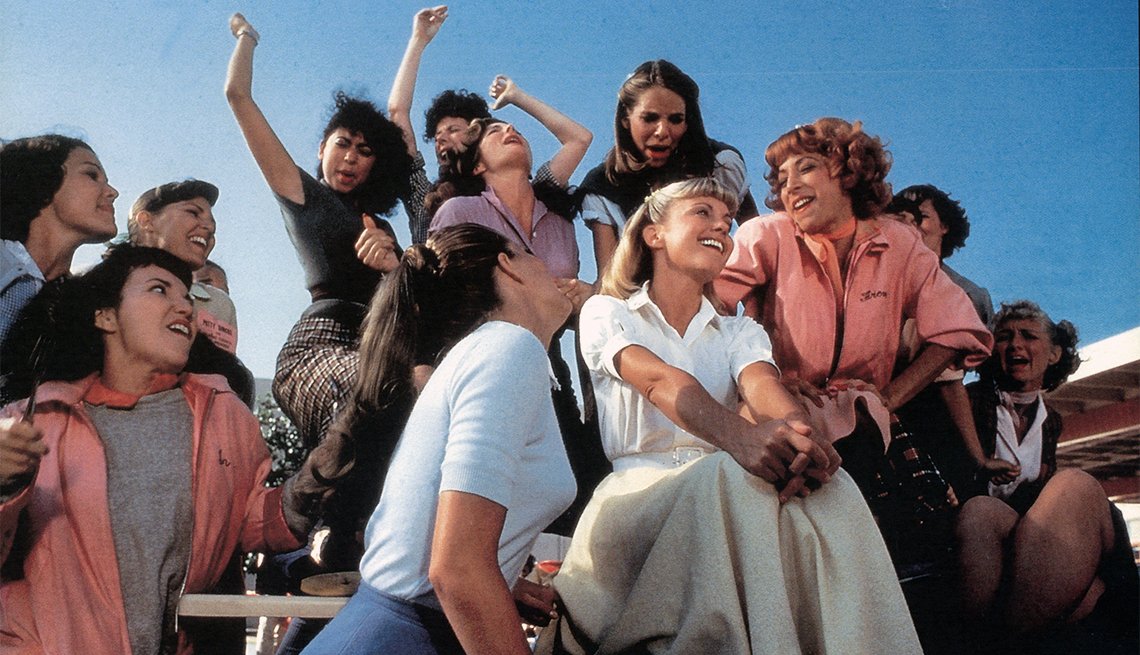While a more age-appropriate film for a six-year-old girl in the 2000s may have included various Barbie movies, I was busy indulging in the 1978 film Grease, a musical that tackles the troubling issues of high-school students, teen pregnancy, senior year and identity – or the lack thereof. It was my mother who introduced me to the film, and I became obsessed with it, even having a Grease themed sixth birthday party. When I asked my mom why I adored the movie as much as I did, a picture about eighteen-year-olds, she said it was because of the music and the dances. Now that I am the eighteen-year-old, I want to reflect on Grease‘s messages on a subtextual level: why they impact me today, and why I’ll never stop singing along.

Grease tells the story of Sandy (Oliva Newton-John) and Danny (John Travolta), two summer lovers in 1959 who reunite at Rydell High for their senior year of high school. Danny is the ‘cool guy’, donning a leather jacket and every other standout physical element of a greaser. Sandy, on the other hand, presents herself as the girl-next-door, Miss Sandra Dee. Throughout the film, Danny and Sandy experience the obstacles of a high school relationship between two people desperately attempting to appeal to their friends. Grease heavily centers around the concept of identity, specifically through the lens of a high school senior. When the film opens to the song ”Grease,” there is a verse that introduces this theme of identity and existence:
“This is a life of illusion, a life of control
Mixed with confusion – what’re we doin’ here?”
Danny has spent four years of his life striving to fit a certain mold and when Sandy provokes him to express a more vulnerable and genuine side of himself, he experiences a crisis. His friends mock his romanticism and Sandy feels betrayed by his inauthentic persona. Sandy, too, struggles with her own image as she feels torn between a pure and wholesome young girl and a confident young woman. This adolescent insecurity is magnified through songs such as “Sandra Dee Reprise”, as Sandy acknowledges her past image of purity and finally decides to reinvent herself.

Though people may interpret Sandy’s arrival in the ending in tight leather and red lipstick as her simply molding to Danny’s fantasy woman, it can be interpreted as an exaggerated symbol of her newly found conviction. For example, towards the beginning of the film, we see Sandy participating as a cheerleader at the pep rally, and she is not very good. It’s likely that Patty Simcox (Susan Buckner), the perfect student and head of the student council, convinced her to join. This scene just shows how anxious and desperate Sandy is to find herself in this foreign environment and proves she isn’t the perfect girl-next-door. When Sandy watches from afar as Danny wins at Thunder Road, the car race between a rival gang, her eyes fixate on both the Pink Ladies and the T-Birds congratulating Danny. The group comes together in celebration and Sandy’s lingering gaze highlights her loneliness. That is all she wants, to feel comfortable and accepted. It is in that scene that she understands that pierced ears and smoking cigarettes do not make you a bad kid and that these people, as rebellious as they may seem, share a genuine friendship. So, her decision to sport leather instead of a sweater should be understood as her self-awareness and decision to be a part of something.

Danny makes a few mistakes in his relationship with Sandy, and each time she becomes upset with him and voices her disappointment. Danny arrives at the carnival in a letterman jacket, having too spent the film searching for a better version of himself. When he approaches Coach Calhoun (Sid Caesar) and the coach asks him to change [his clothes], Danny replies: “That’s why I’m here, to change”. Though it is a comedic moment, it does bring awareness to Danny’s yearning to be better, not only for Sandy but for himself. In the final song, “You’re the One that I Want,” Sandy finally demands Danny treat her better. “You better shape up” Sandy sings as Danny fawns over her, agreeing that he needs to prove himself and satisfy her. Sandy’s attire is a physical manifestation of her confidence, and her and Danny both dressing in similar outfits represents the way the two have found themselves and are now ready to engage in a healthy, genuine relationship.
Though I have mainly focused on the identity issues expressed by the two leads, Rizzo (Stockard Channing) also examines the facets of her personality and reputation, specifically through her solo song “There Are Worse Things I Could Do”. In the song, Rizzo reflects on her inability to be vulnerable and honest. Her conflict with self-image is beautifully acknowledged when she is about to have sex with Kenickie (Jeff Conaway). He begins to moan “Rizzo” when she stops him and asks if he could call her by her first name, Betty. This is a special moment in that Rizzo is lowering her walls and expressing her desire for genuine intimacy. Rizzo’s reputation does not prevent her from experiencing moments of affection, but they do hurt her, as much as she attempts to ignore that.

It is also worth acknowledging that each of the main characters are separated into two groups, the Pink Ladies and the T-Birds, furthering perpetuating this idea of a one-dimensional high school experience and personality, one that Danny and Sandy eventually overcome. On Sandy’s first day of school, Frenchie (Didi Conn) asks if they should let Sandy into the Pink Ladies to which Rizzo replies “she looks too pure to be pink”.
This theme of identity is what makes the film so special to me. One particularly special scene occurs before the carnival, in which Principal McGee (Eve Arden) discusses the potential future of the seniors through the intercom. She says “among you, there might be…” and lists prominent figures in politics and society, as the camera focuses on the face of our graduating characters. Identity was my number one struggle in high school, and I am positive many other high schoolers would say the same. Place that uncertainty in the context of soon graduating and entering adulthood, a time in which you must select your career and overall life path, and it is absolutely terrifying. Grease‘s ending soothes this existential terror by choosing to embrace the playful and fun elements of what it means to be young in the midst of all the obstacles and hardships of juvenescence. Toward the beginning of the film, the Pink Ladies are walking on campus on the first day of their senior year. When Jan (Jamie Donnelly) begins to laugh at the idea of now “ruling the school”, Marty (Dinah Manoff) remarks that Jan is behaving “so adolescent”. Jan replies:
“But we are adolescent!”
This line emphasizes the meaning behind this musical. Now having graduated high school, indulging in the picture I first fell in love with as a child was a moment of nostalgia but also optimism for my future. There are moments in high school that are not all sunshine and rainbows, but that does not mean all the giddiness and joy of those four years should be ignored. Though films that portray the tragic realism of a senior’s graduation and fear of the future were a comfort to me post-graduation, sometimes it is nice to unplug and simply relish in the idea of youth, to see graduation as fun as “shoo-bop sha wadda wadda yippity boom de boom”. Before the gang bursts into “We Go Together”, Jan worries they might never see each other again. Danny casually replies with a smile on his face that that will never happen. And though this may be the more naive approach, sometimes being hopeful and hearing positivity in a time of uncertainty and confusion is a meaningful consolation.



Leave a comment